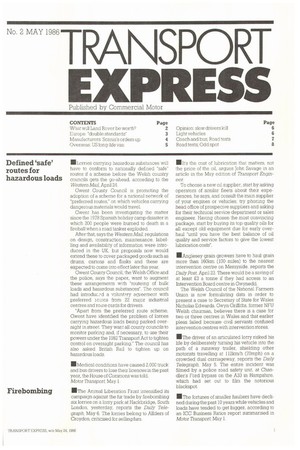Defined 'safe' routes for hazardous loads
Page 27

If you've noticed an error in this article please click here to report it so we can fix it.
• Lorries carrying hazardous substances will have to conform to nationally defined "safe" routes if a scheme before the Welsh country councils gets the go-ahead, according to the Western Mail, April 24. Gwent County Council is promoting the adoption of a scheme for a national network of "preferred routes," on which vehicles carrying dangerous materials would travel. Gwent has been investigating the matter since the 1978 Spanish holiday camp disaster in which 200 people were burned to death in a fireball when a road tanker exploded. After that, says the Western Mail, regulations on design, construction, maintenance, labelling and availability of information were introduced in the UK, but proposals now would extend these to cover packaged goods such as drums, cartons and flasks and these are expected to come into effect later this year. Gwent County Council, the Welsh Office and the police, says the paper, want to augment these arrangements with "routeing of bulk loads and hazardous substances". The council had introduc.-,d a voluntary agreement with preferred ic-a[es from 22 major industrial centres and route cards for drivers.
"Apart from the preferred route scheme, Gwent have identified the problem of lorries carrying hazardous loads being parked overnight in street, They want all county councils to monitor parking and, if necessary, to use their powers under the 1982 Transport Act to tighten control on overnight parking." The council has also asked British Rail to tighten up on hazardous loads.
MMedical conditions have caused 2,000 truck and bus drivers to lose their licences in the past year, the House of Commons was told.
Motor Transport May 1, Firebombing •The Animal Liberation Front intensified its campaign against the fur trade by firebombing six lorries on a lorry park at Hackbridge, South London, yesterday, reports the Daily Telegraph, May 6. The lorries belong to Anders of Croydon, criticised for selling furs. MIt's the cost of lubrication that matters, not the price of the oil, argues Jain Savage in an article in the May edition of Transport Engineer.
To choose a new oil supplier, start by asking operators of similar fleets about their experiences, he says, and consult the main supplier of your engines or vehicles try phoning the head office of prospecive suppliers and asking for their technical service department or sales engineer. Having chosen the most convincing package, start by buying its top quality oils for all except old equipment due for early overhaul "until you have the best balance of oil quality and service factors to give the lowest lubrication costs".
• Anglesey grain growers have to haul grain more than 160km (100 miles) to the nearest intervention centre on Mersyside, reports the Daily Post, April 23. There would be a saving of at least £3 a tonne if they had access to an Intervention Board centre in Gwynedd.
The Welsh Council of the National Farmers Union is now formulating data in order to present a case to Secretary of State for Wales Nicholas Edwards, Gwyn Griffiths, former NFU Welsh chairman, believes there is a case for two or three centres in Wales and that earlier pleas failed because civil servants confused intervention centres with intervention stores.
• The driver of an articulated lorry risked his life by deliberately turning his vehicle into the path of a runaway trailer, shielding other motorists travelling at 112km/h (10mph) on a crowded dual carriageway, reports the Daily Telegraph, May 5. The entire incident was filmed by a police road safety unit, at Chandler's Ford bypass on the A33 in Hampshire, which had set out to film the notorious blackspot.
• The fortunes of smaller hauliers have declined during the past 10 years while vehicles and loads have tended to get bigger, according to an ICC Business Ratios report summarised in Motor Transport, May 1.














































































